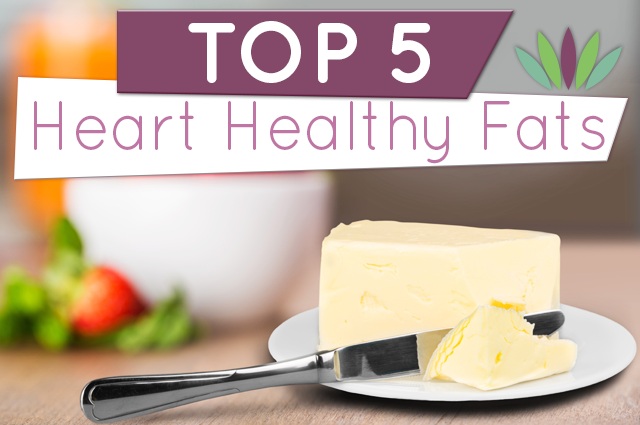For a healthy heart we need saturated fats! … And cholesterol! This comes as a surprise? No wonder! The media has fed you wrong information on heart healthy fats for decades.
For many years, it has been a conventional wisdom that saturated fats and cholesterol are a threat to our cardiovascular health by clogging arteries that would cause atherosclerosis and heart attacks. Therefore, these fats should be held to a minimum if not completely avoided. Instead, high omega-6 vegetable oils and margarines such as canola, corn, olive, peanut, safflower, sesame, soybean, and sunflower are recommended to ensure a healthy heart. This no longer is supported in the scientific literature.
However, there is no compelling evidence that either saturated fats or natural trans fats from animal products pose a threat to our cardiovascular health (1).
In fact, a scientific analysis of 21 studies determined that there is no significant correlation between dietary saturated fat and an increased risk of coronary artery disease.
Another study concluded that replacing saturated fats with high omega-6 vegetable oils is actually likely to put us at greater risk for heart attacks but it certainly will not provide any health benefits (2).
In this case where the deep anchored scepticism about saturated fats and cholesterol is not that easy to remove, let us take a look at the body’s natural composition.
Saturated fats make up over half of all cell membranes. Bones require about 50% of the dietary fat to be saturated for calcium absorption and, moreover, saturated fat lowers lipoprotein-a in the blood, which is an inflammatory marker directly associated with the risk of cardiovascular disease.
Cholesterol is a necessity in the body, yet it is only found in animal fat. It is a strong antioxidant and free radical scavenger and makes up a large portion of the brain (25%). Our body naturally makes over 2000mg cholesterol daily and a mother’s breast milk is very high in it, which means that mother nature definitely gives us a hint here and we should listen.
Let‘s listen to our heart by giving it the fats it desires.
Top 5 Heart Healthy Fats
1. Butter
It is a very common fat that everybody has (or should have from now on) in their fridge. As opposed to industrial trans fat, which increases the the risk of heart disease, the trans-rumenic acid called conjugated linoleic acid (CLA) is thought to decrease the risk for cardiovascular disease. CLA along with other natural trans fats as well as vitamin K2 are abundantly found in grass-fed meat and dairy products, which is why butter is a great source to maintain cardiovascular health and to prevent heart attacks (3).
2. Coconut Oil
Coconut oil currently has gained in popularity for all kinds of health remedies and benefits. The hype is justified and it definitely belongs in the kitchen and on this list! First of all, coconut oil is one of the best oils to cook with as it is with more than 90% almost entirely saturated. Its chemical structure stands out to other fats and oils in our diet, which has a significant effect on the body and the heart. Coconut oil is composed of a special type of saturated fat called medium chain triglyceride (MCT). This structure makes the oil special because the vast majority of fats and oils we consume are composed of long-chain fatty acids (LCFA). In fact, both the saturated and unsaturated fat found in meat, eggs, milk, and plants consist of LCFA.
That means that most of the western world gets way too much of these fats and not enough of the MCFA’s that are found in coconut oil (4).
Why does that matter? Because of its shorter chemical composition, MCFA’s are absorbed with ease without requiring pancreatic enzymes to break them down. This means less work for the pancreas and the fatty acids can go directly to the liver from where they go into the mitochondrias and are immediately utilized for energy. The best part is that coconut oil makes our heart happy by protecting it from heart disease as well as lowering the risk of atherosclerosis.
3. Duck Fat
Just like butter, duck fat is packed with the favorable CLA’s and natural trans fat that were found, in animal studies, to prevent fatty streaks and plaque formation in the arteries of rodents by changing macrophage lipid metabolism (3).
Another statistic, however, shows that the same effect seems to apply for humans as well. According to the World Health Organization’s Multinational Monitoring of Trends and Determinants, in the United States, of every 100,000 middle-aged men, 315 die of heart attacks each year. However, in the Gascony region, where duck liver is a steady part of the diet, this rate is only 80 per 100,000. A great statistic for the consumption of duck fat and the relation to a healthier heart!
4. Leaf Lard
This fat is a highly popular fat in the kitchen of every celebrity cook. For good reason! Lard is a very stable fat which makes it an excellent choice for frying. Moreover, it has a higher smoking point than other fats therefore it is excellent for cooking in general. It is gained from the visceral fat deposit that surrounds the kidney and loin and because of its little pork flavor, leaf lard is considered the highest grade of lard.
Nutritionally speaking, lard is composed of more than twice the monosaturated fat and nearly one-fourth the saturated fat than butter. In addition to that, it is also low in omega-6 fatty acids, known to promote inflammation, which is good news for a healthy heart.
5. Ghee
Ghee, a great fat for cooking, taste, and cardiovascular health. It is made from butter, however, the milk solids and impurities are removed, which makes it consumer friendly for everybody, including people who are lactose or casein intolerant.
Just like coconut oil, it is composed of medium chain fatty acids (MCFA), which are directly absorbed to the liver and burned as energy. Besides of being a fabulous energy source, it contributes to a healthy heart as it protects the arteries from hardening. A study from 2010 found that people in India, where ghee is originated from and thus has the highest population of consumers, had fewer cases of heart disease than our western world (5).










